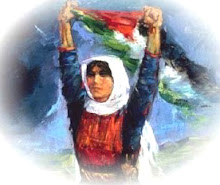By Amira Haas
We had already visited this house, belonging to the Abu Eida family. It is the only one of the family's nine large houses that remained standing at the eastern edge of the city of Jabalya following Operation Cast Lead. The demolition of the family's houses and its four cement factories spells the loss of 40 years of hard work. One Hebrew word scrawled on a wall tells the story of the 10 days when young Israeli soldiers became the ostensible prison wardens of five people. The youngest is Suheila Masalha, 55; the eldest is her mother Fatma, who is perhaps 85 or 90 or older. The only man is her brother Mohammed, 65, who is paralyzed and dependent on the women of his family. And there were two more women from the Abu Eida family - Rasmiya, 70, who owns the house, and her sister-in-law Na'ama, 56, who is blind. "Jail" ("mikhla'a" in Hebrew), wrote the soldiers on the wall of the room where they kept the man and the four women. They did not allow them to use the toilet, but forced them to use all kinds of plastic containers kept in the room, for nine of the days.
From other graffiti you can conclude that it was the soldiers of the Golani Brigade - who were drafted in August 2007, and in January and March of 2008 - who sketched orientation maps on the walls of nearly every room. For example, "Position: entry. Direction: southeast," and a few squares that indicated the houses in the area. "Us," or "We are here," or just an X marked on square No. 5 - Rasmiya Abu Eida's house that became an Israel Defense Forces base.
To Read the article please click on link
http://www.haaretz.com/hasen/spages/1068989.html
Subscribe to:
Post Comments (Atom)















No comments:
Post a Comment